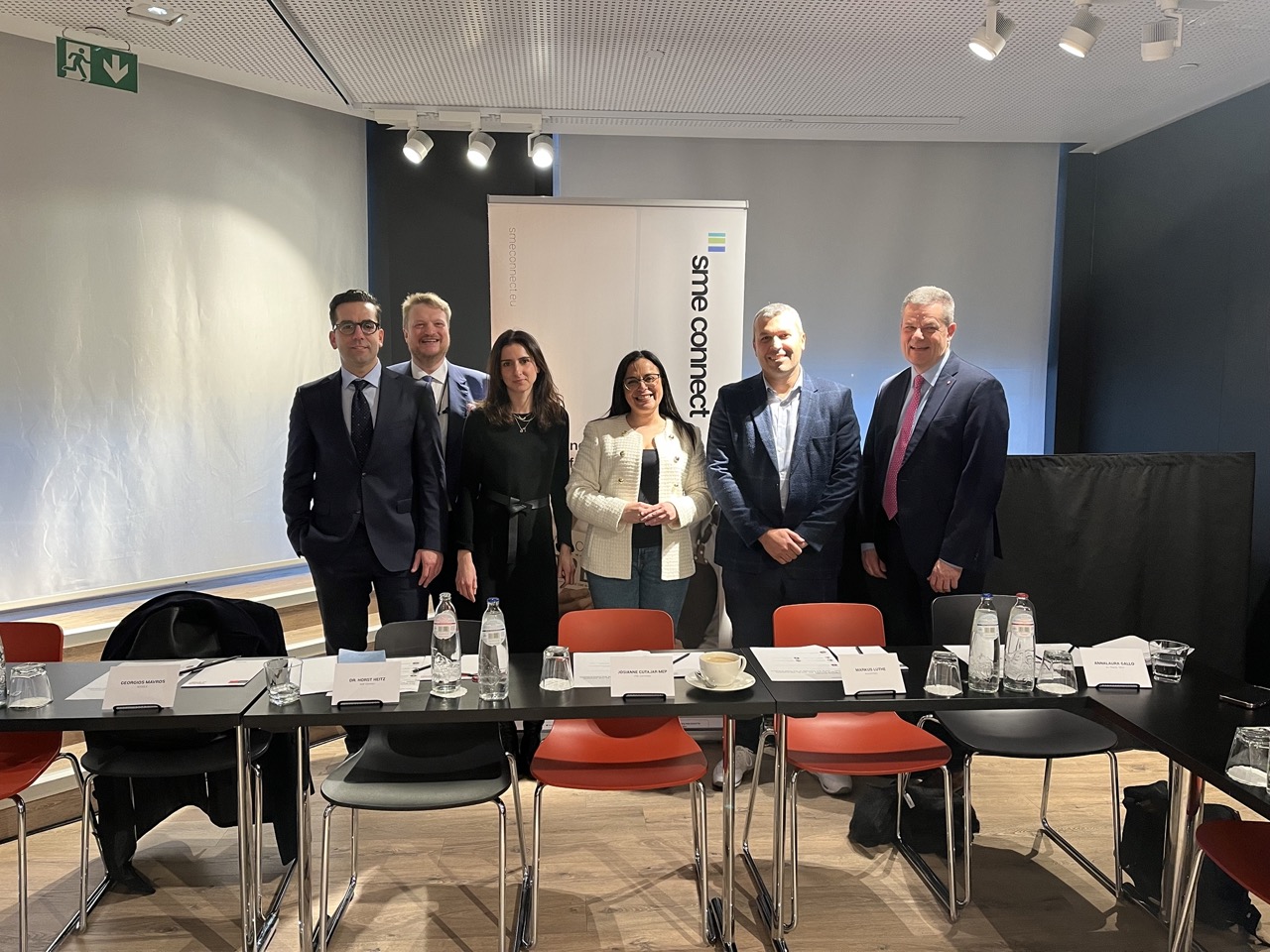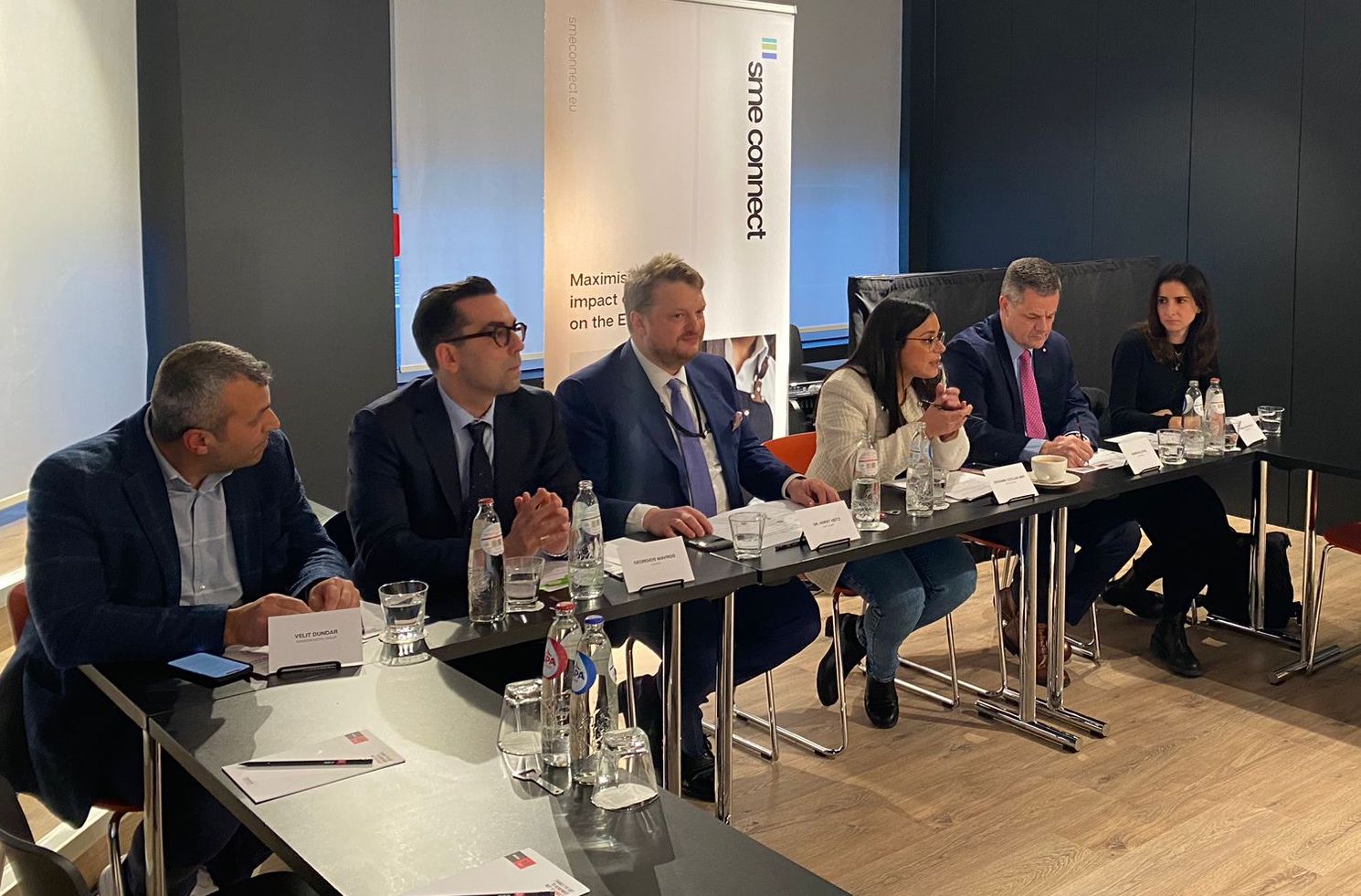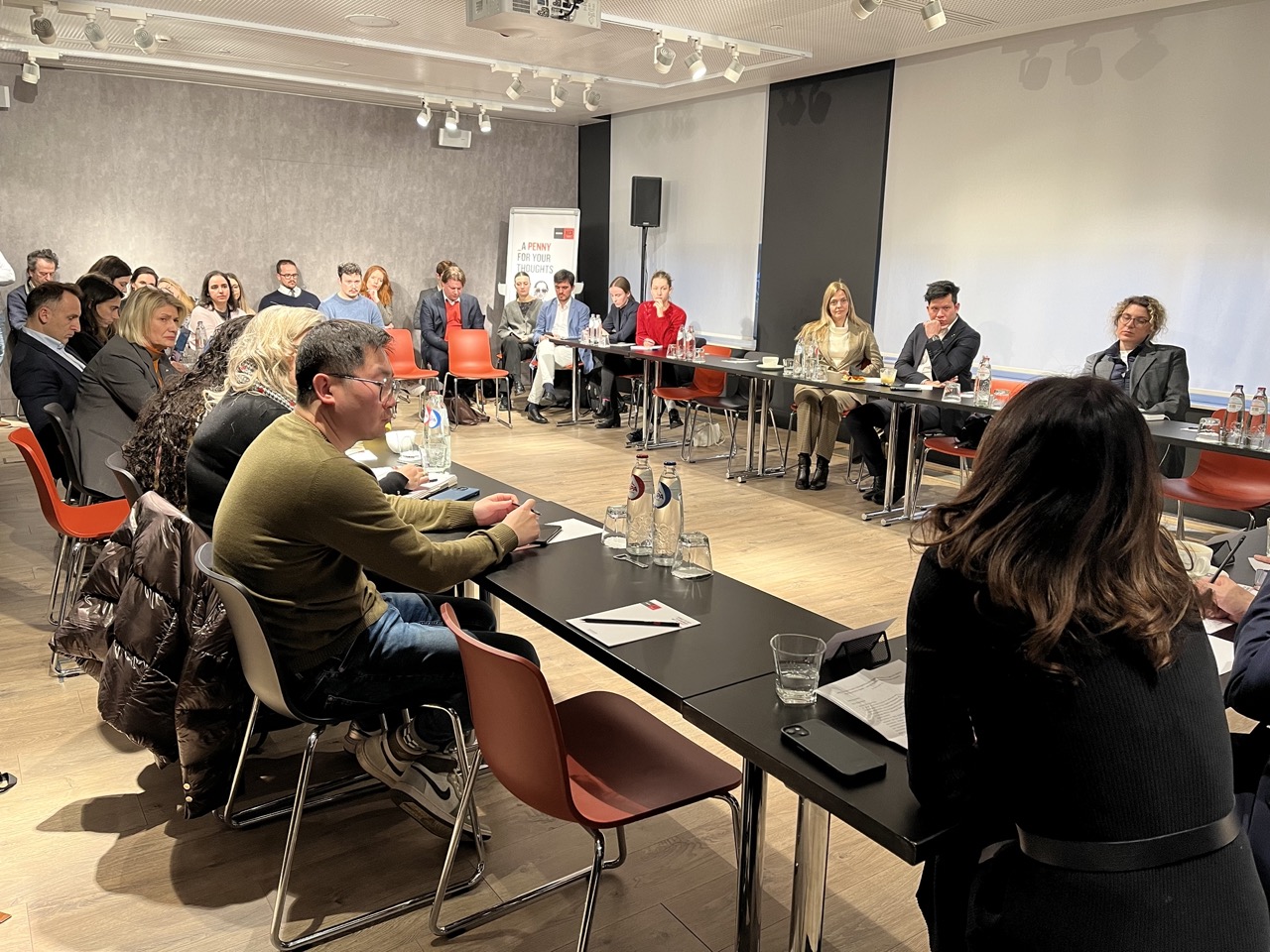Navigating change: The Digital Markets Act and its real economy ripple – using the example of the hotel industry

On Tuesday, February 13th, SME Connect led a roundtable discussion titled “Navigating change: The Digital Markets Act and its real economy ripple – using the example of the hotel industry”. The event was hosted by JOSIANNE CUTAJAR, Member of the European Parliament; Board Member of SME Connect and Chair of SME Connect Working Group on Tourism, Travel and Mobility. The panel featured distinguished experts, including MARKUS LUTHE, CEO of IHA (HotelVerband Deutschland); Member of the Executive Committee at HOTREC; VELIT DUNDAR, Vice President, Global Ecommerce at Radisson Hotel Group; GEORGIOS MAVROS, Senior Manager, Public Policy & Government Relations EMEA, Google and ANNALAURA GALLO, Director for European Affairs at EU Travel Tech. The discussion was moderated by Dr. HORST HEITZ, Chair of the Steering Committee of SME Connect.
JOSIANNE CUTAJAR MEP, who has had the opportunity to work and contribute to the Digital Markets Act as a shadow rapporteur for the TRAN opinion, opened the floor emphasing the importance of skilling and financial resources for effective implementation of the Digital Markets Act (DMA). She highlighted focusing on preventing anti-competitive practices that hinder SMEs in the tourism and hospitality sectors. The DMA is seen as a tool to foster a freer market, empower businesses and consumers, and eliminate unfair practices. Josianne states that the importance of small actors, data privacy, and consent management are underscored and emphasised the need for effective implementation, reviews, and monitoring of the DMA’s impact. Josianne calls for collaboration among policymakers, stakeholders, and customers for the success of the DMA, stressing the role of all actors in adhering to rules and obligations for a fair market and collective prosperity.
Represeting the broad hotel industry sector, MARKUS LUTHE stated how Europe’s hotel industry, which is by 99% dominated by small and medium-sized enterprises, faces challenges with online intermediaries representing, primarily led by three online travel agents (OTAs), and when it comes to relevant visibility for individual hotels in the market, we talk about Google as all journeys begin on the Google search. Markus points out that the introduction of the DMA is welcomed, addressing issues like rate parity clauses and the fair sharing of data. However, challenges persist due to unforeseen events like Covid-19 affecting the gatekeeper designation. Another concern is Google’s adaptation to DMA rules, potentially favoring OTAs over individual hotels, resulting in reduced visibility on Google. The hospitality industry is concerned about its inability to control distribution channels and advocate for algorithms that promote a more organized presentation of organic results.

Continuing on the encouraging note, VELIT DUNDAR highlighted support for the DMA principles to make the marketplace fairer, open to competition, and consumer-friendly. He stressed the significance of SMEs in the local economy and their challenges in adapting to digitalisation as well as raised concern about Google’s dominance and the potential impact of the DMA on hotel visibility, especially for small hotels. Velit advocates for fair competition and equal representation for all players in the value chain, emphasising the importance of consumer choice. Apprehension was expressed about the cascading effects on small hotels’ costs, consumer behaviour, and potential inflation. When discussing the DMA’s core principles, it’s crucial to consider the aligned implementation. We strive to benefit all players in the value exchange, including consumers and SMEs. Radisson, a key player, works extensively with SMEs to protect their interests and drive business value. Striking a balance means ensuring fairness in the process.
ANNALAURA GALLO voiced the active involvement of EU Travel Tech in representing the DMA and scrutinizing how Google fulfills its obligations. Recently, Google disclosed data under the Digital Services Act (DSA), revealing a monthly user base of around 300 to 400 million for its search product. Notably, Google aims to expand its search services, including travel search, with potential implications similar to its practices in the shopping domain. Despite the DMA prohibiting self-preference practices, concerns arise about Google’s compliance solutions not meeting obligations. This prompts the need for balanced discussions on how various interests, including those of platforms and hotels, will be managed in this new environment. Achieving equilibrium in these interests is crucial for future collaboration.

GEORGIOS MAVROS began with explaining the mission of Google which has been to organise the world’s information and make it universally accessible and useful. In the early days, general search services displayed plain blue links, ranking based on basic signals like text and link relationships. However, this approach proved inadequate for various queries, prompting the evolution of search to include rich features like images and carousels. Georgios highlights the role of Google in connecting users to diverse websites, fostering connections and growth for businesses. Local search results alone generate over 1 billion connections to businesses in Europe every month, primarily through organic, unpaid search.
Moving on to the DMA impact, Georgios acknowledged the introduction of wide-ranging obligations, focusing on six key areas, including self-preferencing. The DMA addresses the formats and ranking of search results, requiring fair treatment without favoring in-scope search formats over similar services from other providers. While the DMA doesn’t dictate specific product designs, Google has actively participated in workshops organized by the European Commission to ensure compliance. The aim is to provide added opportunities for aggregators with a dedicated tab for comparison sites on Google search. While anticipating new opportunities, the emphasize is brought to maintaining a positive user experience and ensuring fair opportunities for all businesses in the value chain, avoiding extreme interpretations of the DMA. Crucially, direct suppliers like hotels should retain the ability to showcase prices, ratings, or reviews on search results.
JOSIANNE CUTAJAR MEP stated in the closing remarks that hearing diverse perspectives is crucial for informed legislation. Balancing interests is challenging, yet collaboration, ongoing dialogue, and adherence to fairness and a level playing field are vital. Recognizing the contributions of various players to the European Union and supporting SMEs are integral aspects.
In the Q&A round, various perspectives on the challenges and opportunities related to digitalisation, search engine results, and online platforms in the hotel industry were tackled and discussed from different perspectives. Issues such as the dominance of major search engines, the impact on SMEs, concerns about fair competition, and the role of OTAs as intermediaries were touched upon. The roundtable drew attention to the need for fair visibility on search engines, the impact of organic search results, and the potential consequences of diverting traffic to intermediaries.